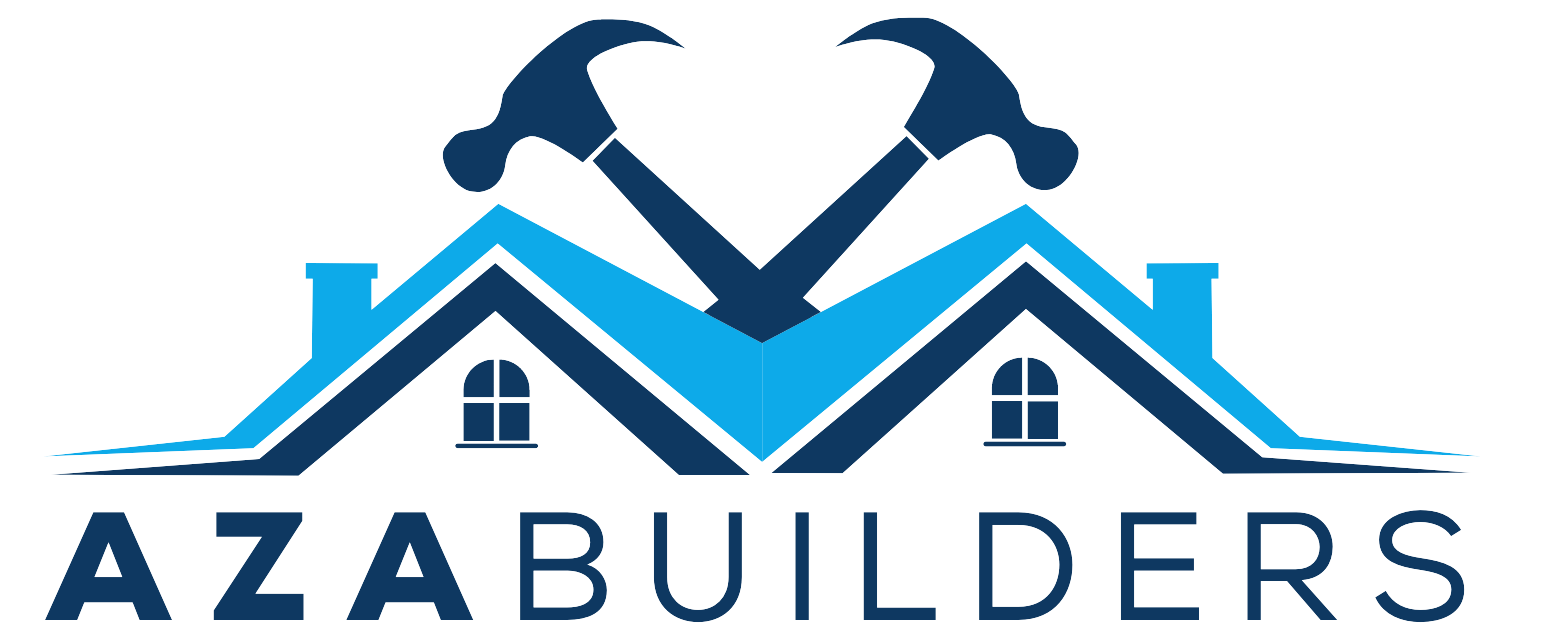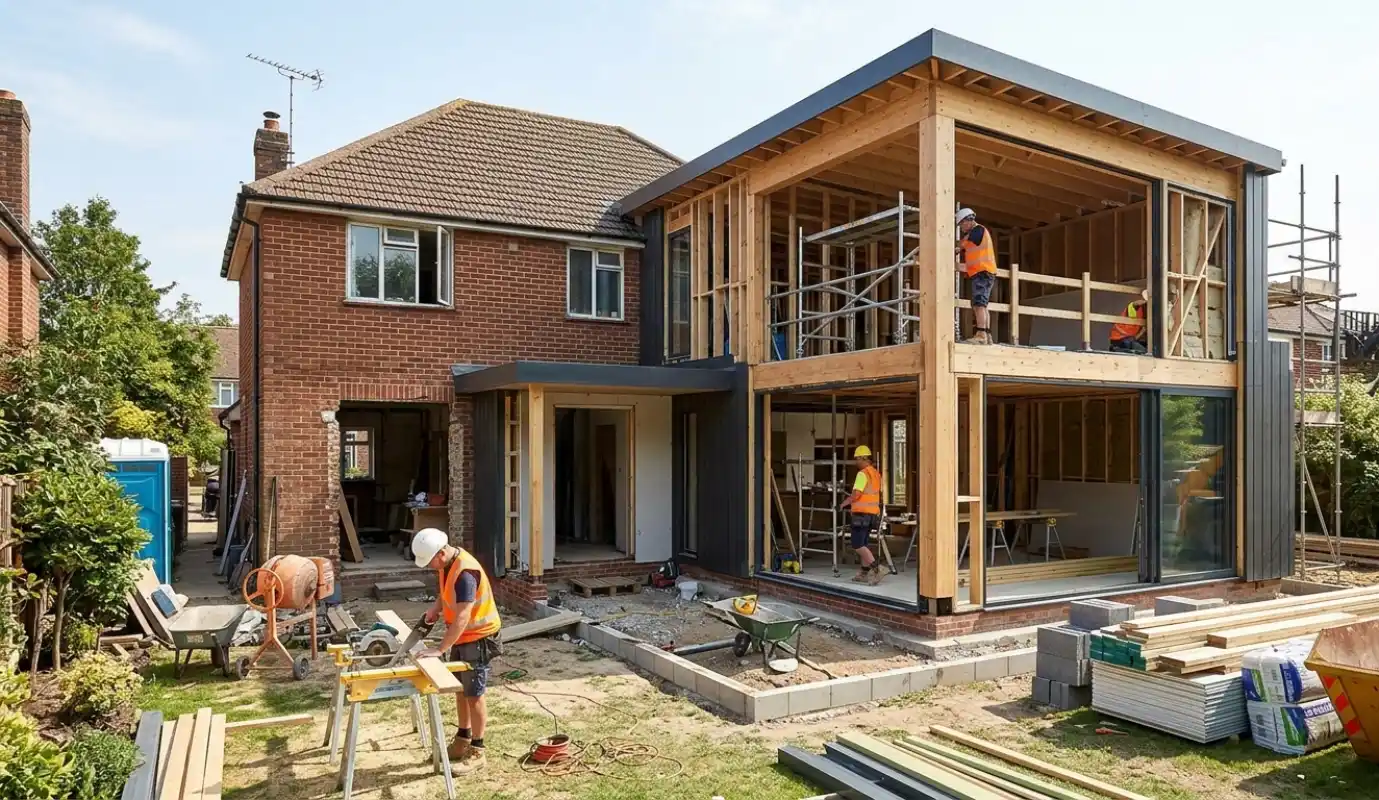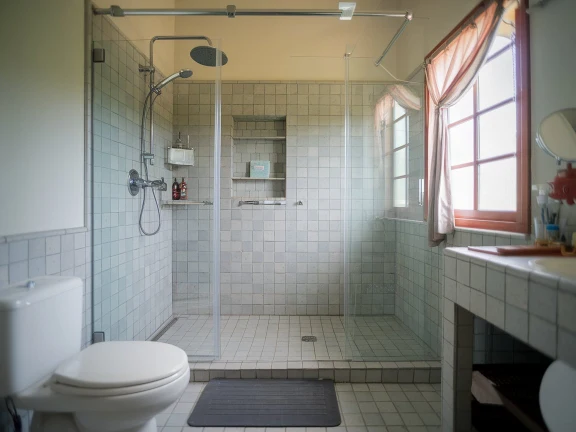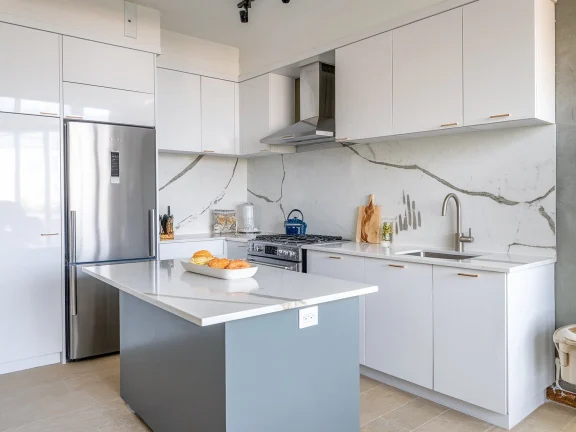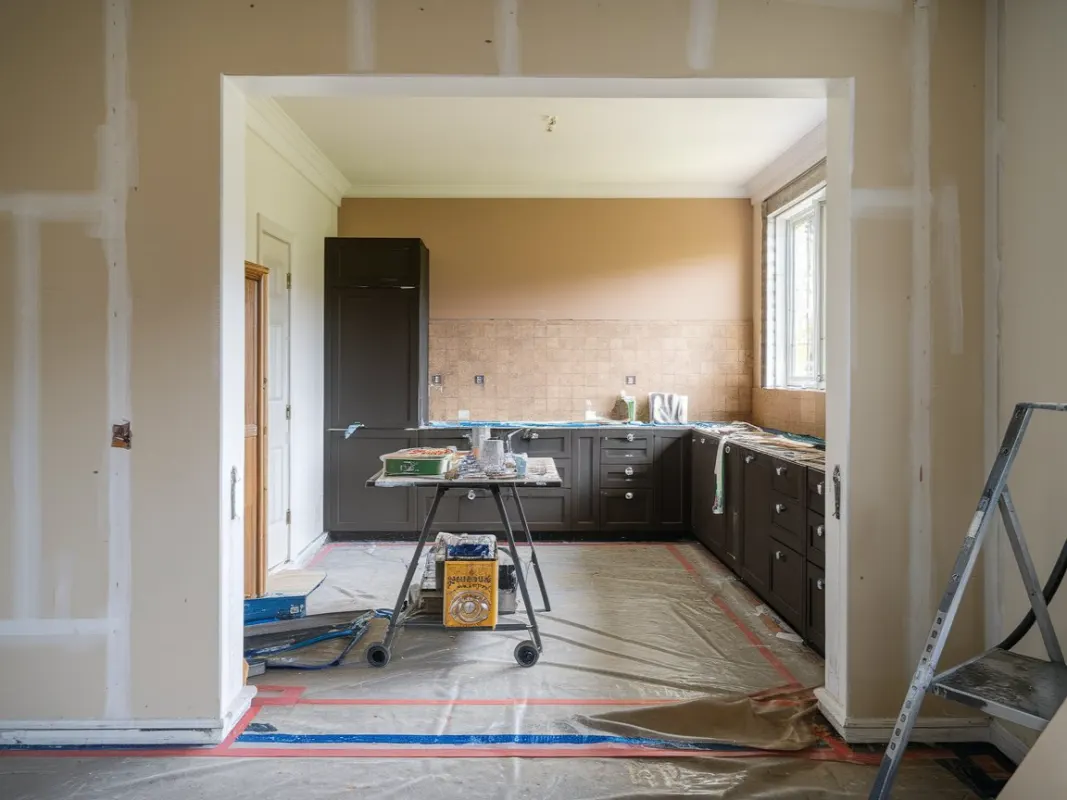Finishing a basement in Virginia presents unique challenges and opportunities for homeowners. Our state’s varying climate and moisture levels require special consideration, but with proper planning, you can transform your underground space into a comfortable living area.
Table of Contents
ToggleIntroduction to Basement Finishing
Finishing your basement is one of the most effective ways to add extra space and value to your Virginia home. Whether you dream of a home theater, a cozy family room, or an additional bedroom, a finished basement can transform unused square footage into a vibrant, functional area. Before you start your project, it’s important to plan ahead consider how you’ll address local building codes, the condition of your foundation walls, and any potential moisture problems. While experienced DIYers may feel comfortable tackling some aspects of the renovation, complex tasks like plumbing and electrical work are best left to professionals. By understanding the process and requirements from the outset, you can create a finished basement that not only meets your family’s needs but also enhances your home’s overall value and comfort.
Starting With Moisture Control
Before diving into the fun design aspects, tackle moisture head-on. Virginia’s humid climate means basement waterproofing isn’t optional – it’s essential. Start by inspecting your foundation for cracks and addressing any existing water issues. It’s crucial to resolve all moisture problems before moving forward with framing or other construction to prevent future complications.
Consider having a sump pump and a quality dehumidifier properly installed if you don’t already have them. Condensation is a common issue in basements, and both dehumidifiers and insulation help control condensation and reduce the risk of mold growth.
Interior drainage systems, waterproof flooring, and sealing cracks and gaps will provide extra protection against our occasional heavy rains.
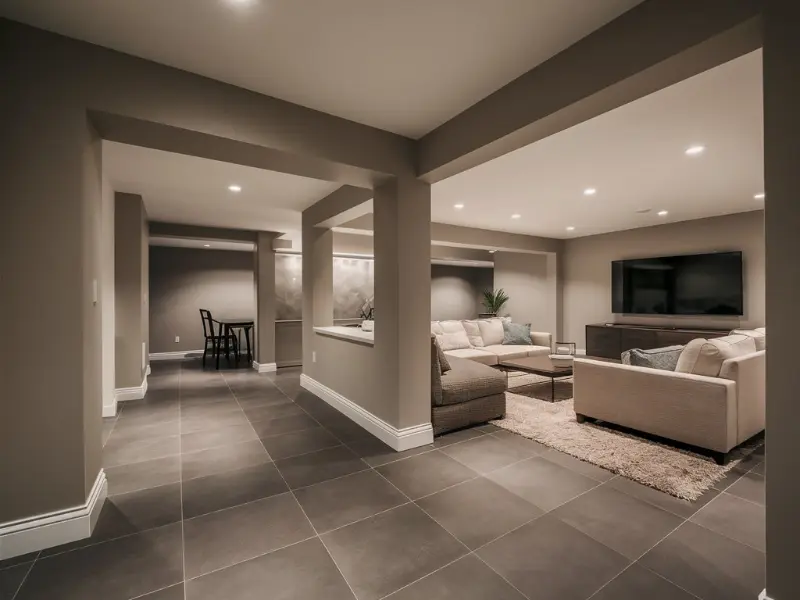
Meeting Virginia Building Codes
Virginia’s building codes have specific requirements for finished basements. You’ll need proper emergency egress windows, and ceiling heights must be at least 7 feet in habitable spaces. Obtain necessary permits from your local building department before starting work. Consult the building inspector for specific requirements and approvals during the basement finishing process. In areas like Northern Virginia, additional local regulations might apply, so check with your county office.
Insulate for Comfort and Efficiency
Virginia’s climate varies significantly, with cold winters and hot, humid summers. Proper insulation is crucial for maintaining comfortable temperatures and reducing energy costs.
-
Recommended Insulation
- Use rigid foam insulation or spray foam to seal gaps and create a vapor barrier.
Avoid Fiberglass
- It can absorb moisture and encourage mold growth, especially in damp environments.
Basement Ceiling Options
Choosing the right basement ceiling can have a big impact on both the look and functionality of your finished space. A drop ceiling is a popular choice for many Virginia homeowners, as it provides easy access to plumbing and wiring while offering a clean, finished appearance. However, keep in mind that a drop ceiling can lower the overall ceiling height, so always check local building codes to ensure you meet minimum requirements. If you prefer a more traditional look, a drywall ceiling is another option, though it may require more time and materials to install.
Maximizing natural light is also important consider installing egress windows or even skylights to brighten the basement and make it feel warmer and more inviting. Ultimately, your choice of basement ceiling should reflect your project goals, desired aesthetic, and the specific needs of your space.
Flooring That Makes Sense
When finishing your basement floor, it’s important to choose the right material to ensure durability and comfort. Consider your flooring carefully. While carpet might feel cozy, it’s not always the best choice for Virginia basements. Solid wood flooring is generally not recommended for basement floors due to moisture concerns, as it can warp or become damaged. Instead, opt for alternatives like engineered wood or luxury vinyl plank (LVP), which mimic the look of wood while offering better resistance to water damage.
Other suitable floors for basements include tile, floating floors, and even heated floors, which can help create a warm and comfortable environment. If you’re set on carpet, install a subfloor system first to create a moisture barrier.
Lighting Your Space
Since natural light is limited in basements, plan your lighting carefully. Recessed lighting works well for overall illumination, while task lighting helps create functional spaces. If possible, enlarge your window wells to maximize natural light – it makes a huge difference in how the space feels
Safety and Emergency Features
Safety should always be a top priority when creating a finished basement. Make sure to install smoke and carbon monoxide detectors, and verify that your egress windows comply with local codes for emergency exits. It’s also wise to keep a fire extinguisher and first aid kit easily accessible in the basement. To maintain healthy moisture levels and prevent mold, consider installing a dehumidifier as part of your renovation. By focusing on these essential safety and emergency features, you’ll create a secure, comfortable environment for your family to enjoy..
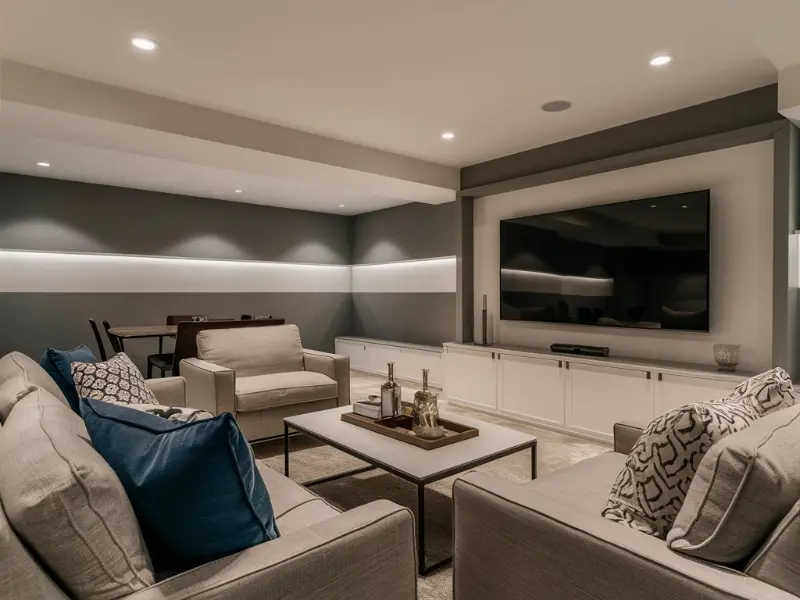
Planning Room Layout
Think carefully about how you’ll use the space. Popular options in Virginia include:
- Home offices (perfect for the growing remote work trend)
- Entertainment rooms (great for those hot summer days inside)
- Guest suites (ideal for visiting family)
- Home gyms (useful year-round)
Consider the placement of support columns and mechanical systems when planning your layout. Sometimes, incorporating these elements into your design (like building a bar around a support post) works better than trying to hide them.
Cost and Value Considerations
In Virginia’s current housing market, a well-done basement finish can significantly increase your home’s value. Expect to invest between $25-50 per square foot, depending on your choices and location. This range is generally in line with, or slightly below, the national average cost per square foot for basement finishing projects. Higher-end finishes in areas like Alexandria or Arlington might cost more but often see better return on investment.
Hiring the Right Help
While some homeowners tackle parts of basement finishing themselves, working with qualified professionals is crucial for complex systems like electrical and plumbing. Choose contractors familiar with Virginia’s specific challenges and building codes. Ask for references and make sure they’re properly licensed and insured.
The Best Time to Start
Weather can impact basement finishing, especially in the early stages if any exterior work is needed. Spring and fall typically offer the best conditions in Virginia, but indoor work can be done year-round with proper planning.
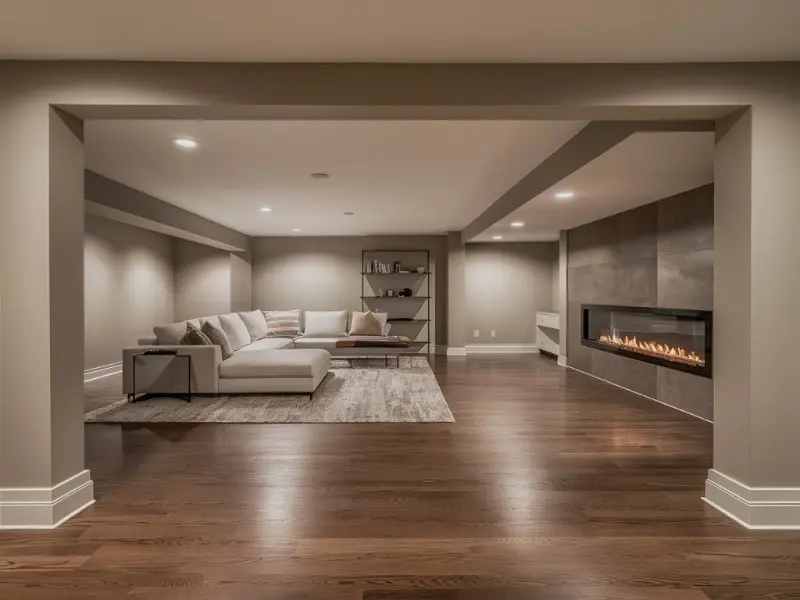
Final Thoughts
Finishing a basement in Virginia requires thoughtful planning and attention to moisture control, insulation, and ventilation. By following these tips, you can transform your basement into a functional, beautiful space that enhances your home and meets your family’s needs. Whether it becomes a guest suite, a home theater, or a personal retreat, the possibilities are endless.
Aza Builders: The Best in Basement Renovations
Aza Builders are your go-to experts for exceptional basement renovations. Renowned for their craftsmanship and attention to detail, they excel in turning unfinished or outdated basements into beautiful, functional spaces tailored to your lifestyle. From addressing moisture issues to delivering modern designs, Aza Builders ensure top-quality results with professionalism at every step. Transform your basement with the trusted expertise of Aza Builders.
Frequently Asked Questions (FAQs)
1. What services do you offer for basement renovations?
We provide comprehensive basement renovation services, including design consultation, waterproofing, insulation, flooring, lighting installation, and complete remodeling tailored to your needs.
As part of the basement renovating process, we also handle debris removal and cleanup, ensuring that all construction and demolition debris such as drywall, lumber, and insulation waste are properly managed.
2. How long does it take to finish a basement renovation project?
The timeline depends on the size and complexity of the project. On average, most renovations take 4–8 weeks, but we provide a detailed schedule during the initial consultation.
3. Do you handle waterproofing and moisture issues?
Yes, addressing moisture and waterproofing is one of our top priorities. We ensure your basement is protected against leaks, humidity, and flooding before starting any renovations.
4. Are your designs customizable?
Absolutely! We work closely with you to create a design that fits your style, budget, and functional needs. Every project is tailored to reflect your vision.
5. Do I need permits for my basement renovation?
In most cases, permits are required for structural changes, electrical work, or plumbing. Our team handles the permit process to ensure compliance with local building codes.
6. Can you create multi-functional basement spaces?
Yes, we specialize in designing versatile spaces, such as home offices, entertainment areas, guest suites, or gym spaces, depending on your preferences.
7. What type of flooring is best for basements?
We recommend water-resistant flooring options such as vinyl planks, tiles, or polished concrete. We’ll help you choose the best option based on your style and functionality needs.
8. How much does a basement renovation cost?
The cost varies depending on the size, materials, and complexity of the project. We provide a detailed quote after an on-site evaluation to ensure transparency and accuracy.
9. Can Azabuilders work within my budget?
Yes, we offer flexible solutions to meet various budgets without compromising on quality. Our team will help prioritize features to deliver the best value for your investment.
10. Do Azabuilders offer warranties on your work?
Yes, we stand behind our craftsmanship and offer warranties on both materials and labor. Details will be provided during the project agreement phase.
